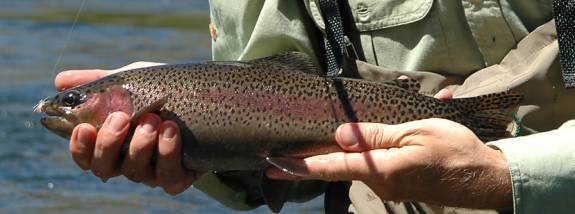Deschutes Daydreams By John Piekos
Copyright ©2006 by John Piekos-All Rights Reserved.
I found myself standing chest
deep in a moss bed with Alder tree branches brushing the side of my head, their
glossy leaves ending a foot above a sipping trout. The focus of my attention was
a rainbow trout that was holding in a slow moving seam of water behind a small
deadfall. As I watched, the trout casually slurped a caddis that drifted over
its nose. My confidence, much like my feet, was slowly sinking into the
vice-grip-like silt found beneath the moss. I prepared myself for the only cast
that would give me a chance with this fish, the ‘bow and arrow’ cast.
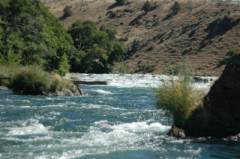 I
was fishing on day three of a four-day float down Central Oregon’s gem, the
Deschutes River. Our guided drift
covered a 30-mile stretch of water running from Trout Creek to Harpham Flats.
The Deschutes River is a majestic place.
I
was fishing on day three of a four-day float down Central Oregon’s gem, the
Deschutes River. Our guided drift
covered a 30-mile stretch of water running from Trout Creek to Harpham Flats.
The Deschutes River is a majestic place.
Its riparian
comprises arid sagebrush hills and savannah-like grasslands interspersed with
striking intrusions of igneous and metamorphic rock, the result of
volcanic activity millions of years ago. Sometimes
flat and wide, other times, narrow, tumultuous and white, the river offers
unparalleled views, from riverside sheer cliffs of columnar basalt to majestic
stands of old-growth ponderosa on adjacent mountain peaks.
I’ve
made an annual pilgrimage to the Deschutes for the past six years.
During that time, the river has provided me with a collection of
triumphant trout fishing memories, which I have stacked like cordwood in the
recesses of my mind. On cold winter
nights I pull a few of these memories off the log pile and toss them in the
fire, warmly remembering and reliving, past triumphs on the river.
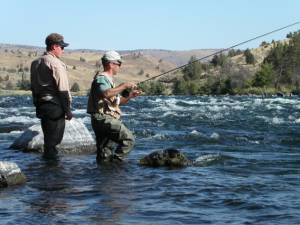 One
memory in particular often occupies my thoughts.
It was the final morning of last year's Deschutes float. I was
stalking the grassy, hummock-riddled East bank of the Deschutes while the guide
crew was breaking down our camp. I had been prospecting, randomly casting to
probable trout holding locations without much luck, when I came upon a
small pool holding several feeding trout. As I stood five feet from the bottom
of the pool and observed the action, a basic plan quickly formed in my mind:
I would first target the lower fish, then one of the two upper fish feeding
along the outer seam of the pool, and if I was lucky and didn't spook him, I
might get a shot at the rainbow feeding just above the small riffle at the top
of the pool.
One
memory in particular often occupies my thoughts.
It was the final morning of last year's Deschutes float. I was
stalking the grassy, hummock-riddled East bank of the Deschutes while the guide
crew was breaking down our camp. I had been prospecting, randomly casting to
probable trout holding locations without much luck, when I came upon a
small pool holding several feeding trout. As I stood five feet from the bottom
of the pool and observed the action, a basic plan quickly formed in my mind:
I would first target the lower fish, then one of the two upper fish feeding
along the outer seam of the pool, and if I was lucky and didn't spook him, I
might get a shot at the rainbow feeding just above the small riffle at the top
of the pool.
What
happened next was magic. As I hooked into each fish, each fish graciously peeled
off toward the center of the river, leaving the remaining trout in the pool
undisturbed. Ten minutes later I
stood at the top of the riffle having successfully cleared the pool of all
comers.
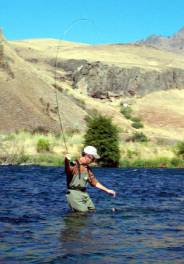 I
remember thinking "This is easy… I’m a good caster", brimming with
confidence. As I surveyed my surroundings and gazed upstream, my heart
skipped a beat. There, twelve feet away, tight along the banking at the
protruding edge of a grass hummock, was one of the largest trout I had seen
on this trip. Because of the protruding grass as well as the shifting
bank-side current, a chance at this fish would require my first cast to be carefully
placed, as close to the tentacle-like blades of grass as possible and high
enough to allow for a decent drift in the slanting current. Before my
casting confidence started to dead drift down stream, I stripped some line, took
a deep breath, made a false cast and shot my fly line forward. The Royal
Wulff landed tight alongside the grass, about two feet beyond the blade of
overhanging grass where I last saw the rising nose of the trout. “A perfect
cast”, I mused. And there it was: a casual lazy sip. As I raised
my rod, the red-sided toad took my fly and blazed down river, quickly going deep
into my backing. After a long exchange of fly line give and take, I
finally landed the rainbow trout whose length was longer than my
forearm, an estimated 22-inch long Deschutes Redside. For me it
was a golden and glorious morning, a memory I stacked in my mind along with
many similar Deschutes memories from past trips.
I
remember thinking "This is easy… I’m a good caster", brimming with
confidence. As I surveyed my surroundings and gazed upstream, my heart
skipped a beat. There, twelve feet away, tight along the banking at the
protruding edge of a grass hummock, was one of the largest trout I had seen
on this trip. Because of the protruding grass as well as the shifting
bank-side current, a chance at this fish would require my first cast to be carefully
placed, as close to the tentacle-like blades of grass as possible and high
enough to allow for a decent drift in the slanting current. Before my
casting confidence started to dead drift down stream, I stripped some line, took
a deep breath, made a false cast and shot my fly line forward. The Royal
Wulff landed tight alongside the grass, about two feet beyond the blade of
overhanging grass where I last saw the rising nose of the trout. “A perfect
cast”, I mused. And there it was: a casual lazy sip. As I raised
my rod, the red-sided toad took my fly and blazed down river, quickly going deep
into my backing. After a long exchange of fly line give and take, I
finally landed the rainbow trout whose length was longer than my
forearm, an estimated 22-inch long Deschutes Redside. For me it
was a golden and glorious morning, a memory I stacked in my mind along with
many similar Deschutes memories from past trips.
But that was last year.
Hubris being what it is, and confidence being boosted by a year of daydreams, I believed this year's float on the Deschutes would be filled with similar such moments. I was both wrong, and foolish to under-estimate our beautiful rainbow trout.
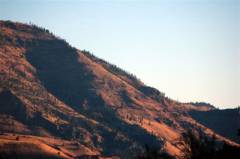 This
year’s float was turning out to be one of those fishing trips, the type
of trip filled with not-so-perfect dead drifts, finicky pressured fish,
culminating in limited success. I was losing, or more likely scaring, more fish
than I caught. A day earlier, this
situation had led our guide Dan to issue a rare stern admonishment, “Look
where you’re casting. You’ll only get one cast on most of these fish.”
These were the most words I think I‘ve ever heard him speak, and they
bruised my ego.
This
year’s float was turning out to be one of those fishing trips, the type
of trip filled with not-so-perfect dead drifts, finicky pressured fish,
culminating in limited success. I was losing, or more likely scaring, more fish
than I caught. A day earlier, this
situation had led our guide Dan to issue a rare stern admonishment, “Look
where you’re casting. You’ll only get one cast on most of these fish.”
These were the most words I think I‘ve ever heard him speak, and they
bruised my ego.
Dan
has been floating the Deschutes River for over two decades. While
some guides find comfort talking up favorite trout spots, hatches,
flora and fauna and even the surrounding striking geology, Dan speaks only
when he has something to say. I suspect his brevity is legendary.
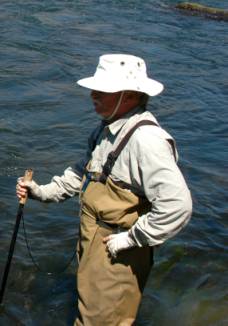 Weather-faced,
he sports a bushy gray mustache, a head of white hair topped off with a
wide-brimmed fishing hat, and he often has a fresh hand-rolled cigarette between
his lips. Over the past few trips, I‘ve come to learn that Dan's guiding
style is as gnarly as his personality. As a fishing guide, he seems
to eschew the obvious trout feeding locations. A nice big eddy chock full
of feeding fish? Forget it. Those
fish would have already been cast to. Bushwhacking through a dense thicket bank
that will ultimately make a back cast impossible, with the unfortunate bonus of
possibly bumping into a rattlesnake nest, or perhaps creeping waist deep
into a weed bed beneath a low canopy of alder branches full of cob webs, with
the off-chance that a spider will fall out of the tree and crawl down your neck?
Sure, these are the spots that peak Dan's guiding sense. "Less
pressure on these trout," Dan offers by way of explanation. When
fishing with Dan, any aspirations of standing on a rock, mid-stream, and casting
to fish in glorious cinematic fashion like Brad Pitt in A
River Runs Through It are quickly dashed.
Weather-faced,
he sports a bushy gray mustache, a head of white hair topped off with a
wide-brimmed fishing hat, and he often has a fresh hand-rolled cigarette between
his lips. Over the past few trips, I‘ve come to learn that Dan's guiding
style is as gnarly as his personality. As a fishing guide, he seems
to eschew the obvious trout feeding locations. A nice big eddy chock full
of feeding fish? Forget it. Those
fish would have already been cast to. Bushwhacking through a dense thicket bank
that will ultimately make a back cast impossible, with the unfortunate bonus of
possibly bumping into a rattlesnake nest, or perhaps creeping waist deep
into a weed bed beneath a low canopy of alder branches full of cob webs, with
the off-chance that a spider will fall out of the tree and crawl down your neck?
Sure, these are the spots that peak Dan's guiding sense. "Less
pressure on these trout," Dan offers by way of explanation. When
fishing with Dan, any aspirations of standing on a rock, mid-stream, and casting
to fish in glorious cinematic fashion like Brad Pitt in A
River Runs Through It are quickly dashed.
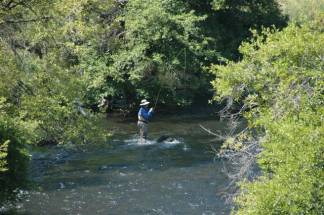 Today’s
fishing adventure with Dan was no different.
After securing the drift boat along the steep bank, Dan wordlessly
marched downstream, with me hastening to catch up. He led me on a lengthy trek
along a series of matted, sun-bleached grass paths that wound through mazes of
fragrant sagebrush. At any moment I
half expected to spook a nesting doe or be warned off by a basking rattlesnake,
both frequent residents in this terrain. The
dodgy walk was worth it, I soon realized, when we came to an opening
between two Alder trees and peered into a sunlit-bathed slice of water brimming
with over a half-dozen large rainbows. Dan instructed me to slowly creep
down to the edge, sit on a rock, and make myself comfortable before attempting a
cast. Taking what seemed like an eternity, I carefully crept into position
only to find that the trout had scattered. "They'll be back in 10
minutes," Dan piped in as he sat in the comfortable shade of the Alder
rolling a homemade cigarette. Meanwhile, I sat in full desert sunlight and
waited. And waited. And waited some more. After ten minutes I had
only seen a couple trout briefly glide through the pool and continue on their
way, apparently spooked by my semi-hidden presence. With sweat dripping
profusely down my face and neck, I began to wonder if this was a guiding trick
to determine how long a client can bake in the sun before raising the white
flag. If so, after over twenty minutes, I hoped I lasted longer than most
and passed Dan’s test. I finally
gave up after making a miserable cast to the solitary trout who eventually had
briefly positioned himself at the top of the pool.
Today’s
fishing adventure with Dan was no different.
After securing the drift boat along the steep bank, Dan wordlessly
marched downstream, with me hastening to catch up. He led me on a lengthy trek
along a series of matted, sun-bleached grass paths that wound through mazes of
fragrant sagebrush. At any moment I
half expected to spook a nesting doe or be warned off by a basking rattlesnake,
both frequent residents in this terrain. The
dodgy walk was worth it, I soon realized, when we came to an opening
between two Alder trees and peered into a sunlit-bathed slice of water brimming
with over a half-dozen large rainbows. Dan instructed me to slowly creep
down to the edge, sit on a rock, and make myself comfortable before attempting a
cast. Taking what seemed like an eternity, I carefully crept into position
only to find that the trout had scattered. "They'll be back in 10
minutes," Dan piped in as he sat in the comfortable shade of the Alder
rolling a homemade cigarette. Meanwhile, I sat in full desert sunlight and
waited. And waited. And waited some more. After ten minutes I had
only seen a couple trout briefly glide through the pool and continue on their
way, apparently spooked by my semi-hidden presence. With sweat dripping
profusely down my face and neck, I began to wonder if this was a guiding trick
to determine how long a client can bake in the sun before raising the white
flag. If so, after over twenty minutes, I hoped I lasted longer than most
and passed Dan’s test. I finally
gave up after making a miserable cast to the solitary trout who eventually had
briefly positioned himself at the top of the pool.
From the proverbial frying pan into the oven, what happened next was the antithesis of my fondest Deschutes fishing memories. Dan had scouted out three “happy trout”, as he called them, feeding along the grassy bank just short of a large Alder tree. To be honest, I vaguely remember the next twenty minutes of “fishing”, which consisted of me scaring off one fish after another. Several nicely placed casts with no takers forced me to switch to a smaller fly, but I couldn’t coax any of the three to bite. Aside from “Okay, try for the next one,” Dan graciously made no comments about my string of ignoble defeats. At times, brevity has some benefits.
That is where I found myself:
crouching beneath the large Alder tree just above the battle zone of recently
scattered trout, questioning my fishing abilities and feeling like I had failed
Dan. True to form, Dan remained
quiet and awaited my bow and arrow cast attempt.
My mind wandered off the task at hand as I imagined Dan suddenly becoming
loquacious around camp later that day, regaling his fellow guides and my fishing
companions with humorous stories of my disastrous fishing day.
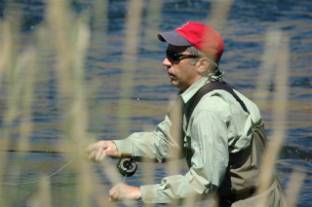 Brushing
cobwebs and caddis off my cheeks, I attempted to put these stray thoughts and
the calamitous last hour behind me. I took a deep breath and pinched the peacock
caddis between my thumb and forefinger. As
I pulled the fly back near my ear, my rod bowing nicely but quivering almost
uncontrollably, I considered my past experience with this cast.
I hadn’t had much luck with it, but in this situation, crouching under
an overhanging Alder tree, it was the only cast that, if executed properly,
would put my fly on the fish. Carefully
calculating where the trout might be holding, I aimed my rod in that direction,
hoping the Alder tree branches wouldn’t snatch my fly before this hungry fish
got a chance to see it. My world
seemed to shrink as concentration took hold.
In that moment I pondered the many lessons learned over the past years on
the Deschutes. With one shot at
this fish I had to ensure that my rod didn’t disturb the water, that I got a
dead drift, and just as importantly given the Alder branch complication, I
needed to determine which direction I would raise the rod to set the hook should
this trout take interest in my fly. Suppressing
my eroding confidence, I focused on the fish. Several caddis fluttered out of
the tree and across my sunglasses. The ever-present roar of the river quieted as
I focused to control my quivering rod. I slowly eased the pressure between my
thumb and forefinger. The tip of my
rod snapped forward, ripping the fly from my fingers and shooting it toward the
dead drift. I found myself holding
my breath, caught in the moment.
Brushing
cobwebs and caddis off my cheeks, I attempted to put these stray thoughts and
the calamitous last hour behind me. I took a deep breath and pinched the peacock
caddis between my thumb and forefinger. As
I pulled the fly back near my ear, my rod bowing nicely but quivering almost
uncontrollably, I considered my past experience with this cast.
I hadn’t had much luck with it, but in this situation, crouching under
an overhanging Alder tree, it was the only cast that, if executed properly,
would put my fly on the fish. Carefully
calculating where the trout might be holding, I aimed my rod in that direction,
hoping the Alder tree branches wouldn’t snatch my fly before this hungry fish
got a chance to see it. My world
seemed to shrink as concentration took hold.
In that moment I pondered the many lessons learned over the past years on
the Deschutes. With one shot at
this fish I had to ensure that my rod didn’t disturb the water, that I got a
dead drift, and just as importantly given the Alder branch complication, I
needed to determine which direction I would raise the rod to set the hook should
this trout take interest in my fly. Suppressing
my eroding confidence, I focused on the fish. Several caddis fluttered out of
the tree and across my sunglasses. The ever-present roar of the river quieted as
I focused to control my quivering rod. I slowly eased the pressure between my
thumb and forefinger. The tip of my
rod snapped forward, ripping the fly from my fingers and shooting it toward the
dead drift. I found myself holding
my breath, caught in the moment.
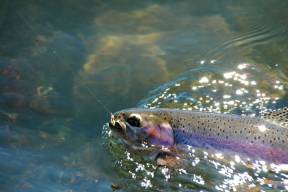
The fly delicately plopped onto the quiet water. I started to admire my newfound bow and arrow-casting prowess when the caddis suddenly vanished beneath a greenish-brown slurp. Sliding my rod shoreward, I realized that I must have placed the fly just in front of the nose of the fish! The fish exploded from the stillness of the pool and took to air in a kinetic explosion of fish and water, flashes of red and silver sparkling in the Oregon sun, before heading deep into the turbulent main current of the Deschutes.
With
my hard-earned trophy on the reel and running, I took a moment to look at Dan
with a huge, satisfying grin. Dan
gave me an approving nod. I think I
even saw him crack a smile.
It would be another daydream
and another log on my mind’s fire.
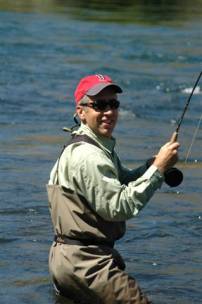
Copyright ©2006 by John Piekos-All Rights Reserved.
